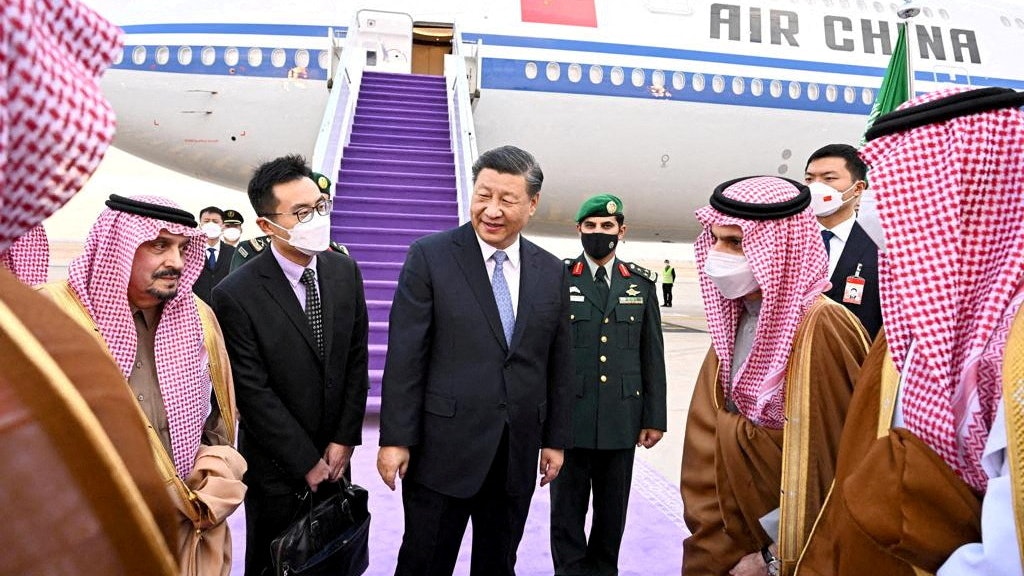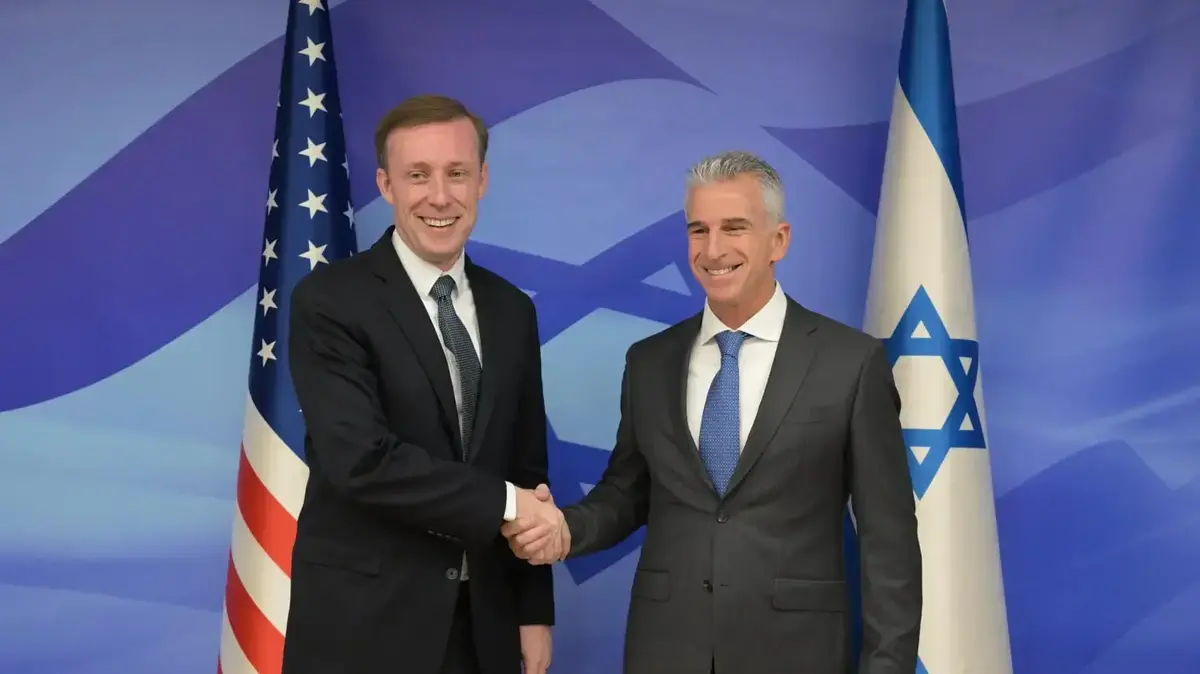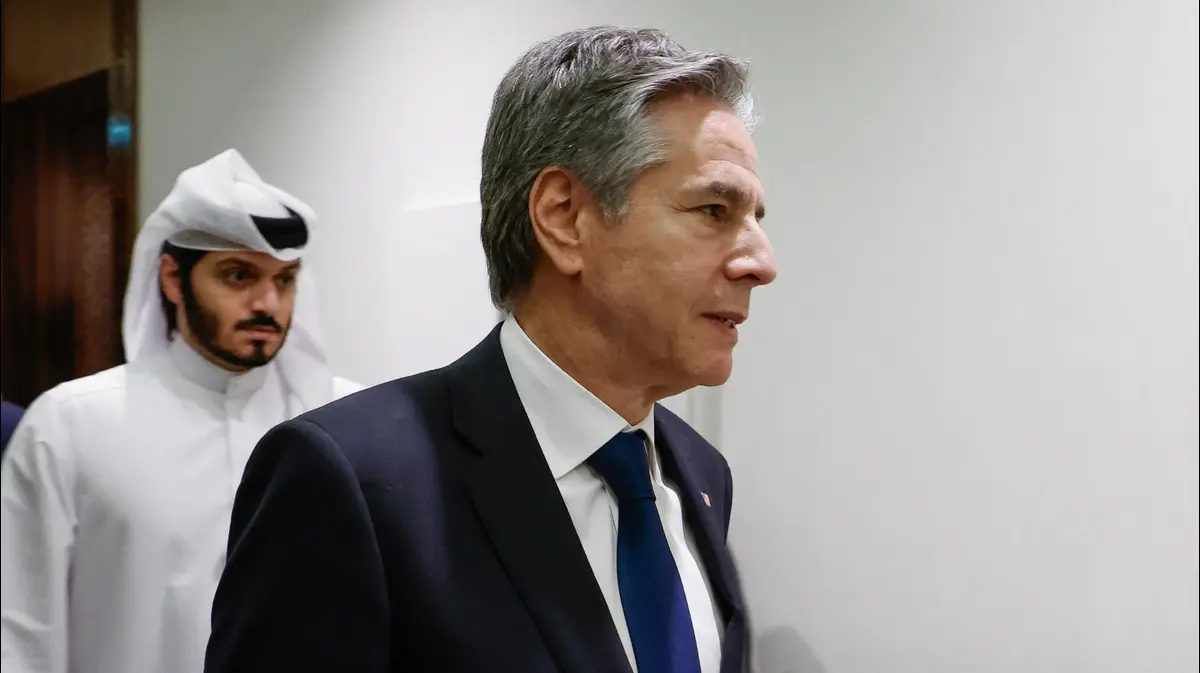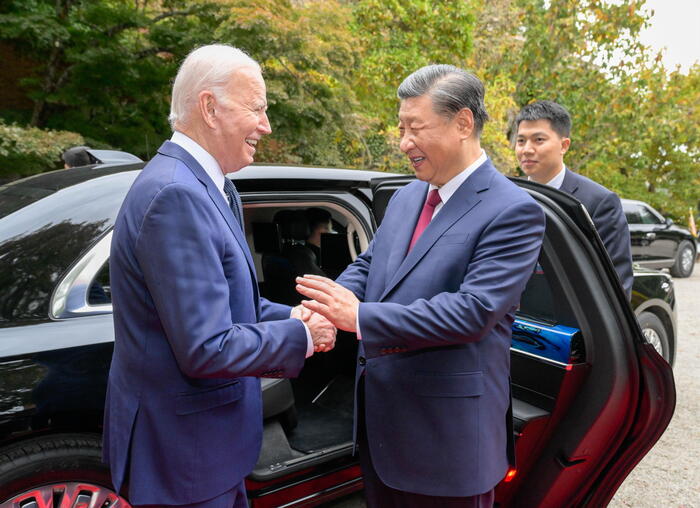On December 7, Chinese President Xi Jinping arrived in Riyadh by special plane, starting his state visit to Saudi Arabia.
In Xi Jinping's written speech, he pointed out that since the establishment of diplomatic relations between China and Saudi Arabia 32 years ago, the strategic mutual trust between the two sides has been continuously consolidated, and the practical cooperation in various fields has achieved fruitful results. bin Salman exchanged in-depth views on bilateral relations and international and regional issues of common concern, and jointly planned the development direction of China-Saudi Arabia relations.
Xi Jinping also pointed out that he looks forward to attending the first China-Arab States Summit and the China-Gulf Arab States Cooperation Council (referred to as the "GCC") summit, and he will work with leaders of Arab countries and GCC countries to promote China-Arab and China-Ghai relations Step up to a new level.
Among them, the promotion of Sino-Arab relations goes without saying, and the promotion of "China-Sea relations" also has profound meanings.
From the perspective of economic and trade data, China-Ghai relations carry the economic essence of Sino-Arab interactions. The two sides even started negotiations on the China-Ghai Free Trade Agreement in July 2004.
However, after China and the GCC completed the ninth round of negotiations in December 2016, the advancement of the free trade agreement was forced to be suspended because internal conflicts in the GCC surfaced.
In June 2017, Saudi Arabia joined forces with the United Arab Emirates and Bahrain to exert pressure on Qatar, which is also a member of the GCC, by means of collectively severing diplomatic relations and blocking the border. Kuwait and Oman had no choice but to mediate between the two sides.
This crisis lasted for three years. It was not until January 2021 that the six GCC countries held a summit meeting in Saudi Arabia. Saudi Arabia and Qatar shook hands and made peace under the witness of all parties. The Qatar crisis since 2017 is coming to an end.
At the same time, China's diplomacy has gradually emerged from the haze of the epidemic.
Since visiting Kazakhstan in September to attend the annual summit of the Shanghai Cooperation Organization ("SCO"), Chinese leaders have resumed foreign visits.
Xi Jinping's high-level visit to Saudi Arabia not only symbolizes the importance China attaches to the Arab world, but also indicates that the GCC will play more roles in China's diplomacy.
Viewed from this perspective, the six-year-suspended negotiations on the China-Global Free Trade Agreement may be restarted at another time when conditions are ripe.
On September 4, 2016, Chinese President Xi Jinping met and shook hands with the then Deputy Crown Prince of Saudi Arabia at the G20 in Hangzhou.
(Reuters)
Cooperative Basis for China-Sea Relations
A closer look at the cooperation foundation of China-Ghailand relations puts energy trade at the core.
Among the proven oil reserves in the world, the six GCC countries account for 29.5%. Saudi Arabia, the United Arab Emirates, and Kuwait are among the top ten oil producers in the world, and Qatar is the fourth largest natural gas producer in the world.
On the other hand, China became the world's largest oil importer in 2013, and its oil consumption is expected to surpass that of the United States in 2034. The reason behind this is the continuous improvement of the country's production capacity, which has jointly promoted the continuous growth of energy demand.
In this context, China-GCC relations are crucial for both sides: China needs to strengthen its energy security, and the GCC needs reliable customers.
At the same time, bilateral trade between China and the GCC has grown significantly in the past 20 years.
In 2000, the trade volume between China and the Sea was less than US$10 billion. In 2016, before the Qatar crisis broke out, the trade volume between China and the Sea exceeded US$100 billion. Among them, Saudi Arabia is China's most important trading partner in the Middle East, and the United Arab Emirates ranks second.
From an overall perspective, the GCC is China's sixth largest export destination and fifth largest import destination. Although energy trade accounts for the majority, as the GCC promotes various infrastructure projects, its demand for Chinese projects Nor can it be ignored.
On September 4, 2016, Chinese President Xi Jinping met and shook hands with the then Deputy Crown Prince of Saudi Arabia at the G20 Summit in Hangzhou.
(Reuters)
The mutual investment between China and the sea also plays an important role in the bilateral relations.
As the GCC countries have accumulated a large amount of petrodollar reserves, their foreign investment behavior is quite significant, including purchasing private company stocks, investing in foreign government securities, and providing funds for projects in other countries.
In this context, China formulated a series of preferential policies to attract funds from the GCC, and launched large-scale oil exploration projects to create conditions for the GCC countries to expand investment in China; at the same time, with the 2013 "Belt and Road" initiative Start-up and GCC countries have proposed blueprints for economic diversification, and Chinese funds have gradually flowed into local emerging industries to explore non-petrochemical fields.
Take the United Arab Emirates as an example. China is the second largest trading partner of the United Arab Emirates. In 2018, China's foreign direct investment flow, the United Arab Emirates ranked 14th. In that year, China purchased 10% of the shares of three offshore oil fields in Abu Dhabi.
In 2019, Abu Dhabi National Oil Company (ADNOC) and Chinese companies established a joint shipping joint venture in the liquefied natural gas (LNG) field to jointly explore new cooperation opportunities between the two countries.
In the field of non-petrochemical investment, a large amount of Chinese capital has poured into the real estate and construction industries, accounting for 46% of China's total investment in the UAE. Many Chinese companies have even established their headquarters in the Jebel Ali Free Zone (JAFZA) in the UAE. Projects throughout the peninsula provide services.
In short, China-GCC relations in the new era not only focus on energy trade, but also relate to the alignment of the national development strategies of China and the GCC: under the vision of the “Belt and Road” initiative, Chinese companies and projects will continue to deploy in the GCC countries. It is hoped that To expand the geographical presence in the Arab world and even the Middle East; and the GCC countries also need large-scale funds and projects to realize national industrial transformation and lay out the development route of the post-oil era.
On August 31, 2016, Chinese President Xi Jinping and then Deputy Crown Prince Mohammed bin Salman met with officials from both sides before the G20 summit in Hangzhou.
(Reuters)
The Era Significance of the China-Global Free Trade Agreement
In this context, the weight of the times carried by the China-Global Free Trade Agreement has become increasingly enormous.
In 2014, the sixth ministerial meeting of the China-Arab Cooperation Forum was held in Beijing. Xi Jinping proposed the "1+2+3" model of China-Arab cooperation at the meeting.
Among them, "1" represents the main axis of energy cooperation, which is to deepen cooperation in the oil and gas industry between China and Arab states, maintain the safety of energy transportation channels, and build a strategic cooperative relationship; Cooperation on major development projects, establishment of institutional arrangements to promote bilateral trade and investment; "3" is to make breakthroughs in the three major fields of nuclear energy, aerospace satellites, and new energy to enhance the level of practical cooperation between China and Arab states. Xi Jinping said that the two sides can discuss the establishment of The China-Arab Technology Transfer Center, the joint establishment of the Arab Peaceful Use of Nuclear Energy Training Center, and the study of China's Beidou satellite navigation system landing project in Arabia.
The practice of the above three points is inseparable from the cooperation with the GCC: in the field of "1" energy strategy construction, only the GCC has this capability in the Arab world; "2" institutional arrangements for infrastructure, economic and trade investment , not unique to the GCC, but in addition to accepting projects, the Gulf countries can also act as a platform hub for Chinese companies to radiate to the peninsula and even the entire Arab world; "3" high-tech cooperation such as nuclear energy and new energy is unique to the GCC. There is room for cooperation in funds, policies, resources, and talents in the countries of the Federation.
In order to integrate the "1+2+3" cooperation pattern of China Shipping, both parties must establish new institutional arrangements.
Therefore, in January 2016, when Xi Jinping paid a state visit to Saudi Arabia, he met with the then Secretary-General of the GCC there, emphasizing that China hopes to speed up the negotiation process of the free trade agreement; Several rounds of negotiations were held in Riyadh, in Guangzhou in May, in Beijing in October, and again in Riyadh in December. The outside world predicted that the agreement would soon be settled. Unfortunately, the diplomatic crisis in Qatar turned out in 2017, which led to the abrupt end of the Sino-Sea negotiations. end.
Now that the GCC conflict has ended and China-GCC cooperation has continued to deepen, the resumption of free trade agreement negotiations should have overcome historical obstacles.
Saudi King Salman received a welcoming ceremony at the Great Hall of the People during his visit to Beijing in March 2017 to meet with Xi Jinping.
(Xinhua News Agency)
From the new perspective of the Sino-US game and the multi-polarization of the international order, the current China-Global Free Trade Agreement has at least three major significances.
First, build guardrails for China's energy security.
With the growth of China's development, its energy demand will increase simultaneously. Therefore, comprehensively upgrading the cooperation with the GCC and planning the energy trade between the two sides through institutional arrangements will be able to maintain China's energy security to the greatest extent and provide stable support for China's development strategy. .
Second, build a China-Sea economic and trade cooperation platform.
As mentioned above, China-Ghailand cooperation is not limited to energy trade, but also includes infrastructure projects and capital injection. From a global perspective, the Gulf region has huge potential in engineering contracting and labor services markets.
Therefore, the implementation of the China-GCC Free Trade Agreement is not only conducive to the growth of two-way investment, but also supports the "going out" strategy of Chinese enterprises, and creates more opportunities for Chinese enterprises to carry out project contracting and labor service cooperation in the GCC countries.
Third, reduce the risk of China being marginalized.
From the perspective of enterprises, the institutional security of the China-Global Free Trade Agreement can increase the participation of enterprises on both sides, effectively avoid the negative impact of trade diversion, and prevent marginalization in regional competition; from a political perspective, in today’s Sino-US game In the pattern, a comprehensive upgrade of cooperation with the GCC can effectively safeguard China's political and economic interests in the Middle East, enrich Beijing's local geopolitical fulcrum, and allow China to take more initiative.
In addition, after the China-Global Free Trade Agreement is implemented, it may be combined with mechanisms such as the Shanghai Cooperation Organization to become China's geo-economic support in Eurasia.
When Xi Jinping visited Saudi Arabia in 2016, the trend of world multi-polarization was not yet obvious; now, with the United States withdrawing from the Middle East and the outbreak of the Russia-Ukraine war, the multi-polar order is rapidly taking shape.
Although the negotiation of the China-Global Free Trade Agreement has been delayed, it will inevitably play a more important role in the future world.
Why did the negotiation process of the China-Global Free Trade Agreement stop after 2016?
The diplomatic crisis broke out in Qatar, and the GCC was unable to act in unison.
What are the three major significances of the China-Global Free Trade Agreement?
Build energy security guardrails for China, build a China-Global economic and trade cooperation platform, and reduce the risk of China being marginalized
Xi Jinping's visit to Saudi Arabia to attend the cooperation summit Scholars: China and Arab states have sent a signal to the United States that "there is another choice"
Xi Jinping may visit Saudi Arabia within a week: What message does the first China-Arab summit convey?
What important signal does "Xi Jinping's upcoming visit to Saudi Arabia" convey?


/cloudfront-eu-central-1.images.arcpublishing.com/prisa/5CYUPDL33BHRNA5AWKOZ3OGFK4.JPG)






